Ethics, Legalities, and Nursing: Case Study Analysis
VerifiedAdded on 2022/08/16
|8
|1770
|10
Report
AI Summary
This report delves into the critical intersection of ethics and law within the nursing profession, emphasizing adherence to the ANA Code of Ethics and the Health Insurance Portability and Accountability Act (HIPAA). It addresses the importance of ethical decision-making, patient confidentiality, and the implications of violating HIPAA regulations. The report presents a case study involving a nursing student's unprofessional conduct, including a social media post that violated patient privacy, and explores the legal consequences. The analysis highlights the need for nurses to establish therapeutic relationships, respect patient autonomy, and maintain the integrity of protected health information. Furthermore, it references a documented HIPAA violation case that resulted in legal action, underscoring the severity of such breaches. The conclusion reinforces the necessity for nurses to uphold ethical standards and comply with HIPAA to ensure positive patient outcomes and avoid legal repercussions. The report also fulfills the requirements of an assignment, including a handwritten apology, an essay in APA format, and completion of a HIPAA course.
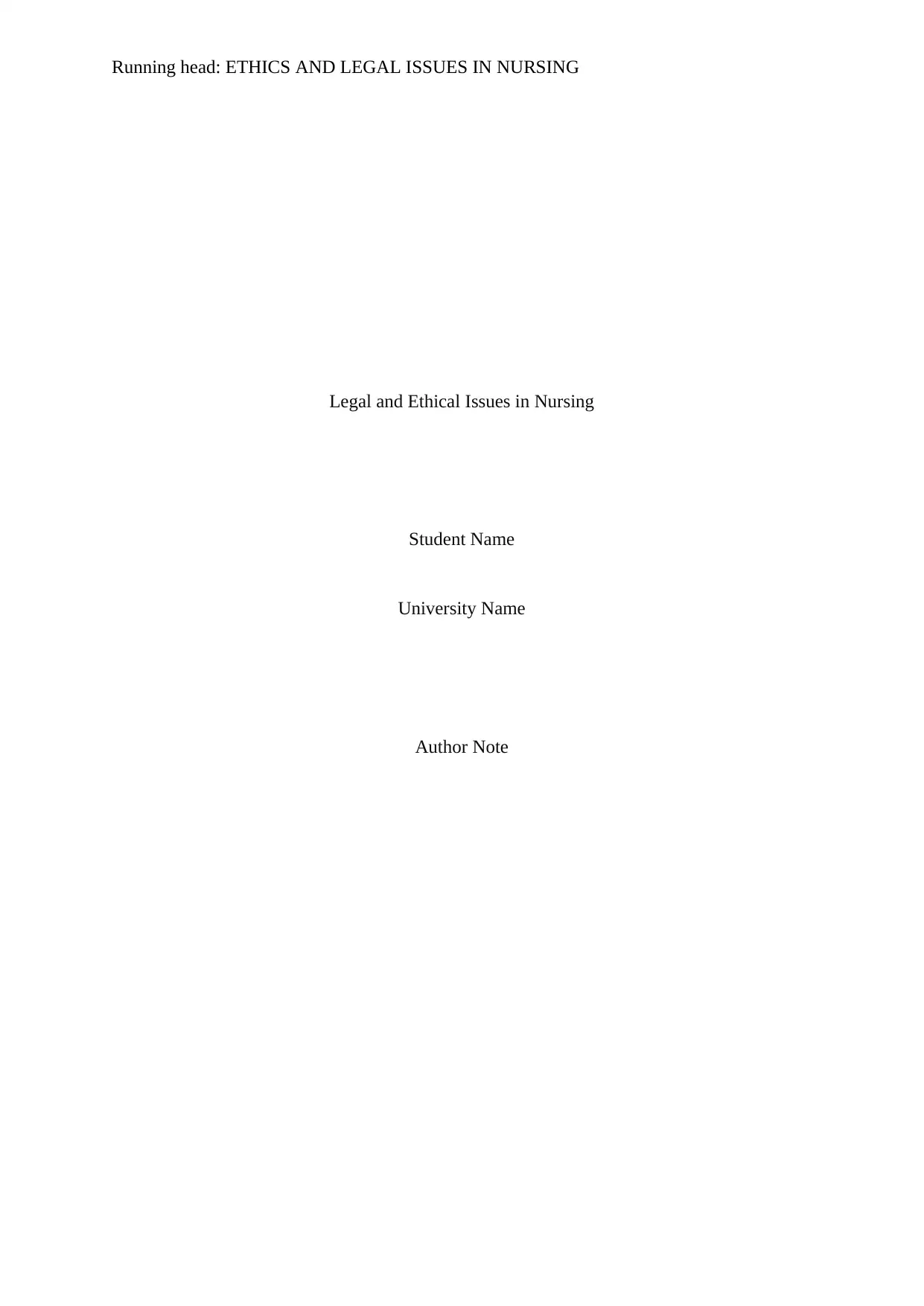
Running head: ETHICS AND LEGAL ISSUES IN NURSING
Legal and Ethical Issues in Nursing
Student Name
University Name
Author Note
Legal and Ethical Issues in Nursing
Student Name
University Name
Author Note
Paraphrase This Document
Need a fresh take? Get an instant paraphrase of this document with our AI Paraphraser
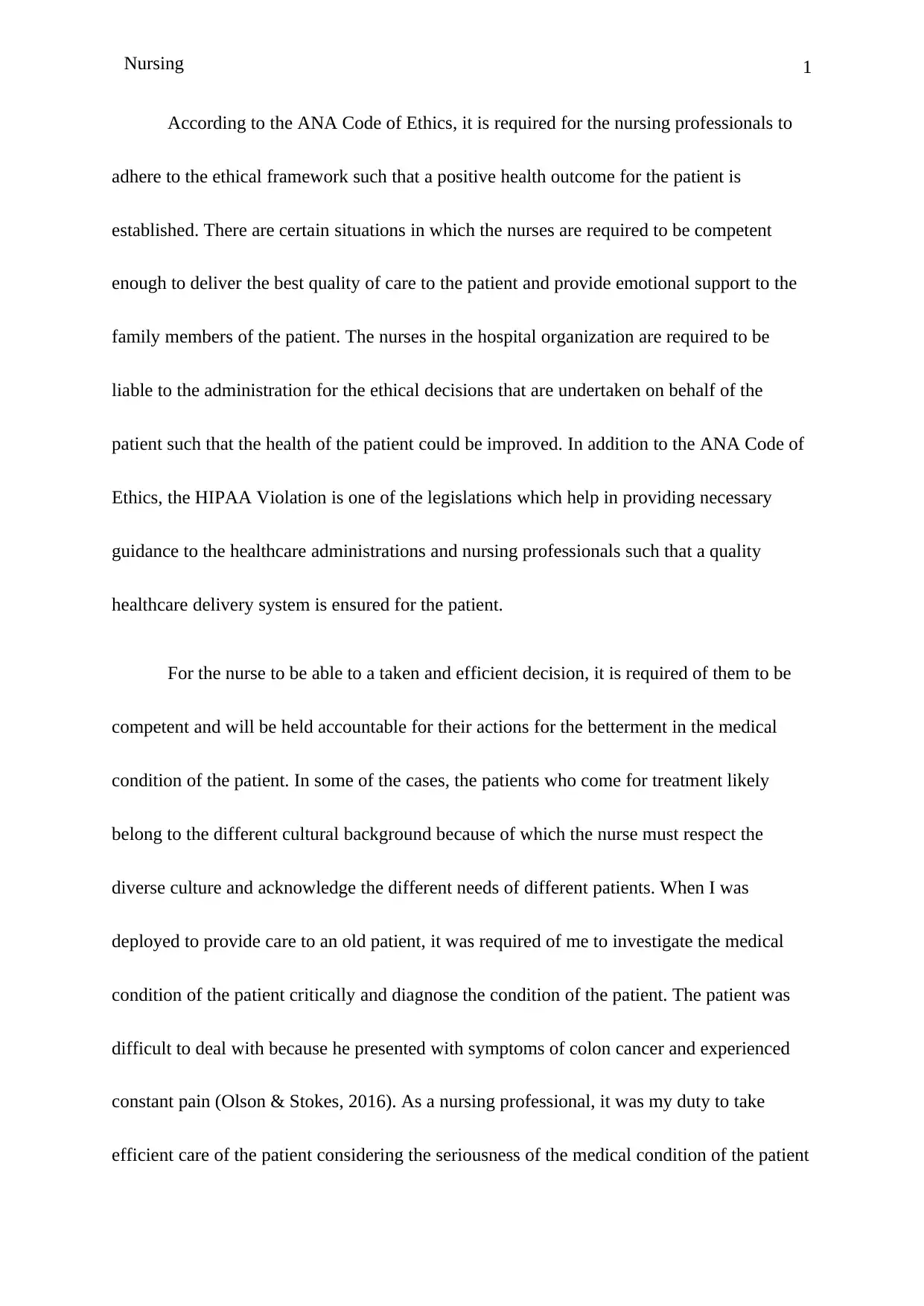
1
According to the ANA Code of Ethics, it is required for the nursing professionals to
adhere to the ethical framework such that a positive health outcome for the patient is
established. There are certain situations in which the nurses are required to be competent
enough to deliver the best quality of care to the patient and provide emotional support to the
family members of the patient. The nurses in the hospital organization are required to be
liable to the administration for the ethical decisions that are undertaken on behalf of the
patient such that the health of the patient could be improved. In addition to the ANA Code of
Ethics, the HIPAA Violation is one of the legislations which help in providing necessary
guidance to the healthcare administrations and nursing professionals such that a quality
healthcare delivery system is ensured for the patient.
For the nurse to be able to a taken and efficient decision, it is required of them to be
competent and will be held accountable for their actions for the betterment in the medical
condition of the patient. In some of the cases, the patients who come for treatment likely
belong to the different cultural background because of which the nurse must respect the
diverse culture and acknowledge the different needs of different patients. When I was
deployed to provide care to an old patient, it was required of me to investigate the medical
condition of the patient critically and diagnose the condition of the patient. The patient was
difficult to deal with because he presented with symptoms of colon cancer and experienced
constant pain (Olson & Stokes, 2016). As a nursing professional, it was my duty to take
efficient care of the patient considering the seriousness of the medical condition of the patient
Nursing
According to the ANA Code of Ethics, it is required for the nursing professionals to
adhere to the ethical framework such that a positive health outcome for the patient is
established. There are certain situations in which the nurses are required to be competent
enough to deliver the best quality of care to the patient and provide emotional support to the
family members of the patient. The nurses in the hospital organization are required to be
liable to the administration for the ethical decisions that are undertaken on behalf of the
patient such that the health of the patient could be improved. In addition to the ANA Code of
Ethics, the HIPAA Violation is one of the legislations which help in providing necessary
guidance to the healthcare administrations and nursing professionals such that a quality
healthcare delivery system is ensured for the patient.
For the nurse to be able to a taken and efficient decision, it is required of them to be
competent and will be held accountable for their actions for the betterment in the medical
condition of the patient. In some of the cases, the patients who come for treatment likely
belong to the different cultural background because of which the nurse must respect the
diverse culture and acknowledge the different needs of different patients. When I was
deployed to provide care to an old patient, it was required of me to investigate the medical
condition of the patient critically and diagnose the condition of the patient. The patient was
difficult to deal with because he presented with symptoms of colon cancer and experienced
constant pain (Olson & Stokes, 2016). As a nursing professional, it was my duty to take
efficient care of the patient considering the seriousness of the medical condition of the patient
Nursing
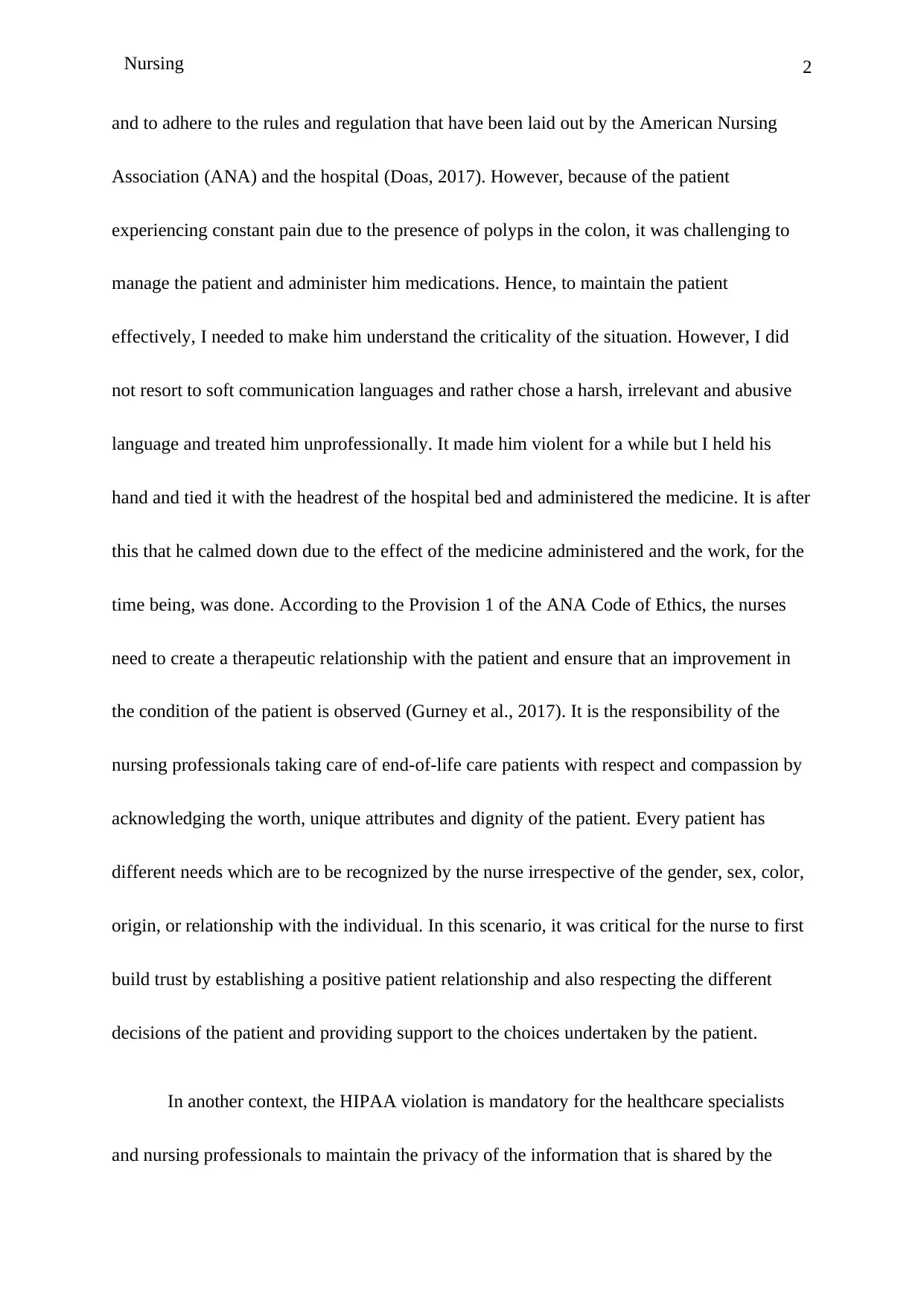
2
and to adhere to the rules and regulation that have been laid out by the American Nursing
Association (ANA) and the hospital (Doas, 2017). However, because of the patient
experiencing constant pain due to the presence of polyps in the colon, it was challenging to
manage the patient and administer him medications. Hence, to maintain the patient
effectively, I needed to make him understand the criticality of the situation. However, I did
not resort to soft communication languages and rather chose a harsh, irrelevant and abusive
language and treated him unprofessionally. It made him violent for a while but I held his
hand and tied it with the headrest of the hospital bed and administered the medicine. It is after
this that he calmed down due to the effect of the medicine administered and the work, for the
time being, was done. According to the Provision 1 of the ANA Code of Ethics, the nurses
need to create a therapeutic relationship with the patient and ensure that an improvement in
the condition of the patient is observed (Gurney et al., 2017). It is the responsibility of the
nursing professionals taking care of end-of-life care patients with respect and compassion by
acknowledging the worth, unique attributes and dignity of the patient. Every patient has
different needs which are to be recognized by the nurse irrespective of the gender, sex, color,
origin, or relationship with the individual. In this scenario, it was critical for the nurse to first
build trust by establishing a positive patient relationship and also respecting the different
decisions of the patient and providing support to the choices undertaken by the patient.
In another context, the HIPAA violation is mandatory for the healthcare specialists
and nursing professionals to maintain the privacy of the information that is shared by the
Nursing
and to adhere to the rules and regulation that have been laid out by the American Nursing
Association (ANA) and the hospital (Doas, 2017). However, because of the patient
experiencing constant pain due to the presence of polyps in the colon, it was challenging to
manage the patient and administer him medications. Hence, to maintain the patient
effectively, I needed to make him understand the criticality of the situation. However, I did
not resort to soft communication languages and rather chose a harsh, irrelevant and abusive
language and treated him unprofessionally. It made him violent for a while but I held his
hand and tied it with the headrest of the hospital bed and administered the medicine. It is after
this that he calmed down due to the effect of the medicine administered and the work, for the
time being, was done. According to the Provision 1 of the ANA Code of Ethics, the nurses
need to create a therapeutic relationship with the patient and ensure that an improvement in
the condition of the patient is observed (Gurney et al., 2017). It is the responsibility of the
nursing professionals taking care of end-of-life care patients with respect and compassion by
acknowledging the worth, unique attributes and dignity of the patient. Every patient has
different needs which are to be recognized by the nurse irrespective of the gender, sex, color,
origin, or relationship with the individual. In this scenario, it was critical for the nurse to first
build trust by establishing a positive patient relationship and also respecting the different
decisions of the patient and providing support to the choices undertaken by the patient.
In another context, the HIPAA violation is mandatory for the healthcare specialists
and nursing professionals to maintain the privacy of the information that is shared by the
Nursing
⊘ This is a preview!⊘
Do you want full access?
Subscribe today to unlock all pages.

Trusted by 1+ million students worldwide
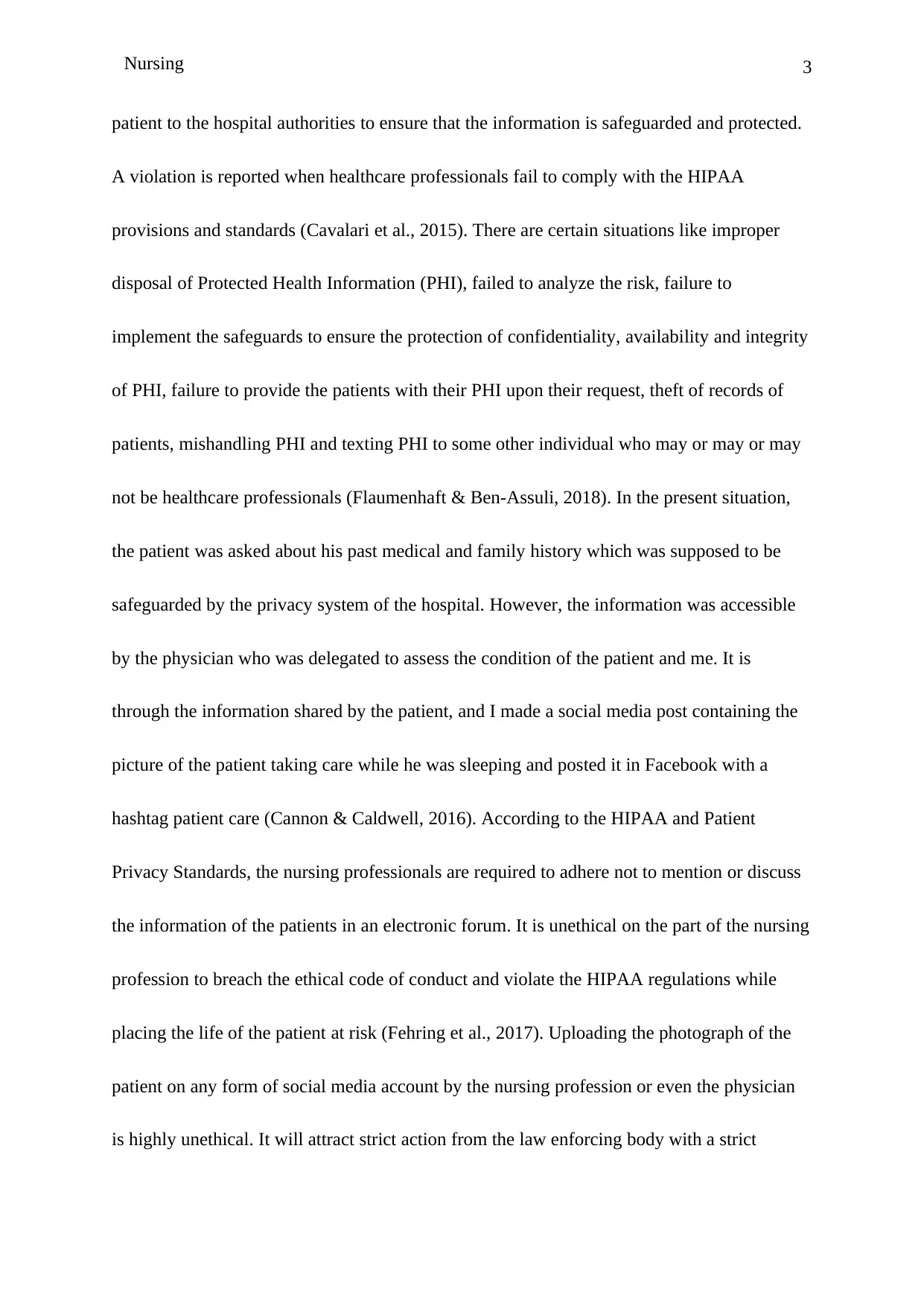
3
patient to the hospital authorities to ensure that the information is safeguarded and protected.
A violation is reported when healthcare professionals fail to comply with the HIPAA
provisions and standards (Cavalari et al., 2015). There are certain situations like improper
disposal of Protected Health Information (PHI), failed to analyze the risk, failure to
implement the safeguards to ensure the protection of confidentiality, availability and integrity
of PHI, failure to provide the patients with their PHI upon their request, theft of records of
patients, mishandling PHI and texting PHI to some other individual who may or may or may
not be healthcare professionals (Flaumenhaft & Ben-Assuli, 2018). In the present situation,
the patient was asked about his past medical and family history which was supposed to be
safeguarded by the privacy system of the hospital. However, the information was accessible
by the physician who was delegated to assess the condition of the patient and me. It is
through the information shared by the patient, and I made a social media post containing the
picture of the patient taking care while he was sleeping and posted it in Facebook with a
hashtag patient care (Cannon & Caldwell, 2016). According to the HIPAA and Patient
Privacy Standards, the nursing professionals are required to adhere not to mention or discuss
the information of the patients in an electronic forum. It is unethical on the part of the nursing
profession to breach the ethical code of conduct and violate the HIPAA regulations while
placing the life of the patient at risk (Fehring et al., 2017). Uploading the photograph of the
patient on any form of social media account by the nursing profession or even the physician
is highly unethical. It will attract strict action from the law enforcing body with a strict
Nursing
patient to the hospital authorities to ensure that the information is safeguarded and protected.
A violation is reported when healthcare professionals fail to comply with the HIPAA
provisions and standards (Cavalari et al., 2015). There are certain situations like improper
disposal of Protected Health Information (PHI), failed to analyze the risk, failure to
implement the safeguards to ensure the protection of confidentiality, availability and integrity
of PHI, failure to provide the patients with their PHI upon their request, theft of records of
patients, mishandling PHI and texting PHI to some other individual who may or may or may
not be healthcare professionals (Flaumenhaft & Ben-Assuli, 2018). In the present situation,
the patient was asked about his past medical and family history which was supposed to be
safeguarded by the privacy system of the hospital. However, the information was accessible
by the physician who was delegated to assess the condition of the patient and me. It is
through the information shared by the patient, and I made a social media post containing the
picture of the patient taking care while he was sleeping and posted it in Facebook with a
hashtag patient care (Cannon & Caldwell, 2016). According to the HIPAA and Patient
Privacy Standards, the nursing professionals are required to adhere not to mention or discuss
the information of the patients in an electronic forum. It is unethical on the part of the nursing
profession to breach the ethical code of conduct and violate the HIPAA regulations while
placing the life of the patient at risk (Fehring et al., 2017). Uploading the photograph of the
patient on any form of social media account by the nursing profession or even the physician
is highly unethical. It will attract strict action from the law enforcing body with a strict
Nursing
Paraphrase This Document
Need a fresh take? Get an instant paraphrase of this document with our AI Paraphraser
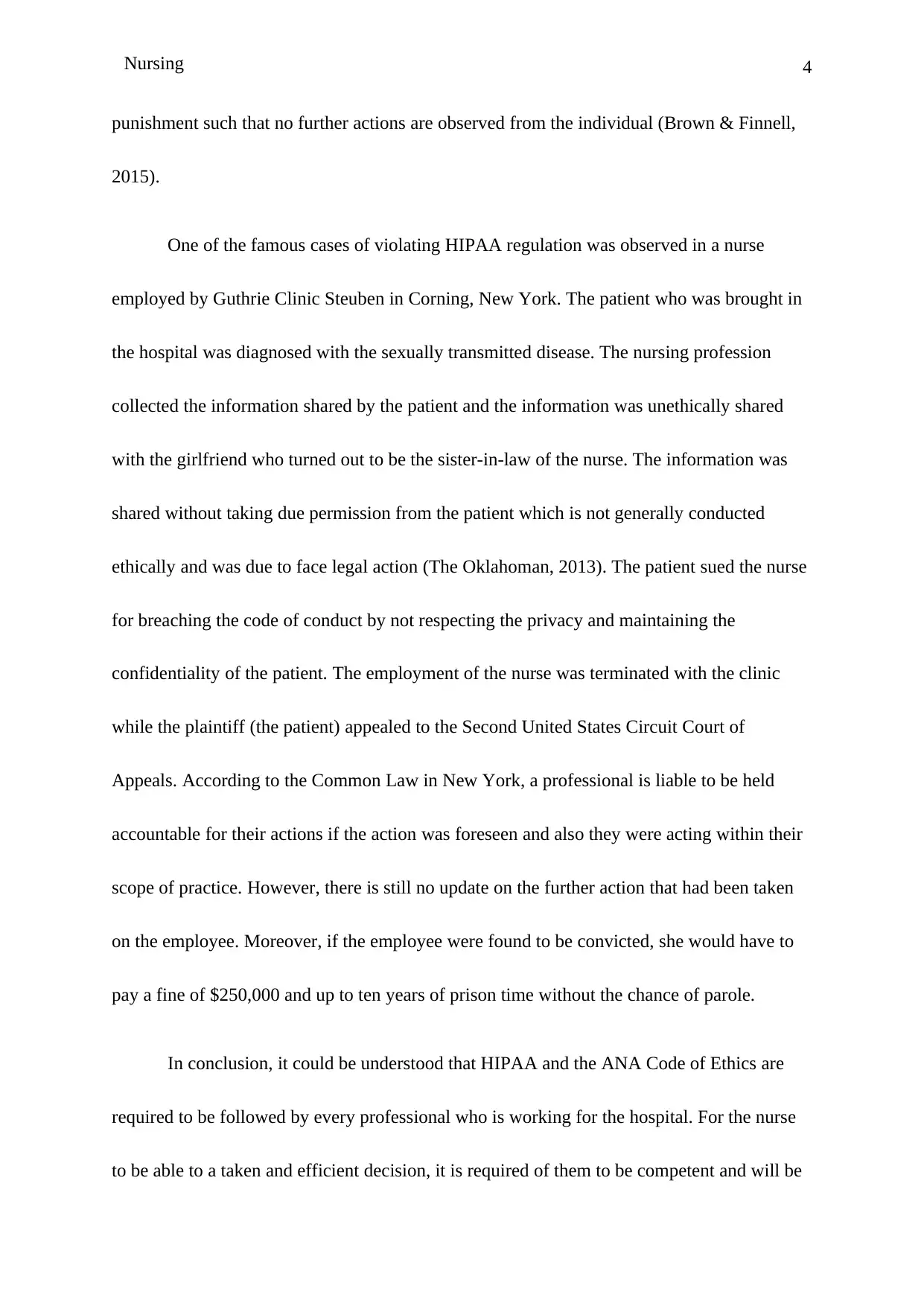
4
punishment such that no further actions are observed from the individual (Brown & Finnell,
2015).
One of the famous cases of violating HIPAA regulation was observed in a nurse
employed by Guthrie Clinic Steuben in Corning, New York. The patient who was brought in
the hospital was diagnosed with the sexually transmitted disease. The nursing profession
collected the information shared by the patient and the information was unethically shared
with the girlfriend who turned out to be the sister-in-law of the nurse. The information was
shared without taking due permission from the patient which is not generally conducted
ethically and was due to face legal action (The Oklahoman, 2013). The patient sued the nurse
for breaching the code of conduct by not respecting the privacy and maintaining the
confidentiality of the patient. The employment of the nurse was terminated with the clinic
while the plaintiff (the patient) appealed to the Second United States Circuit Court of
Appeals. According to the Common Law in New York, a professional is liable to be held
accountable for their actions if the action was foreseen and also they were acting within their
scope of practice. However, there is still no update on the further action that had been taken
on the employee. Moreover, if the employee were found to be convicted, she would have to
pay a fine of $250,000 and up to ten years of prison time without the chance of parole.
In conclusion, it could be understood that HIPAA and the ANA Code of Ethics are
required to be followed by every professional who is working for the hospital. For the nurse
to be able to a taken and efficient decision, it is required of them to be competent and will be
Nursing
punishment such that no further actions are observed from the individual (Brown & Finnell,
2015).
One of the famous cases of violating HIPAA regulation was observed in a nurse
employed by Guthrie Clinic Steuben in Corning, New York. The patient who was brought in
the hospital was diagnosed with the sexually transmitted disease. The nursing profession
collected the information shared by the patient and the information was unethically shared
with the girlfriend who turned out to be the sister-in-law of the nurse. The information was
shared without taking due permission from the patient which is not generally conducted
ethically and was due to face legal action (The Oklahoman, 2013). The patient sued the nurse
for breaching the code of conduct by not respecting the privacy and maintaining the
confidentiality of the patient. The employment of the nurse was terminated with the clinic
while the plaintiff (the patient) appealed to the Second United States Circuit Court of
Appeals. According to the Common Law in New York, a professional is liable to be held
accountable for their actions if the action was foreseen and also they were acting within their
scope of practice. However, there is still no update on the further action that had been taken
on the employee. Moreover, if the employee were found to be convicted, she would have to
pay a fine of $250,000 and up to ten years of prison time without the chance of parole.
In conclusion, it could be understood that HIPAA and the ANA Code of Ethics are
required to be followed by every professional who is working for the hospital. For the nurse
to be able to a taken and efficient decision, it is required of them to be competent and will be
Nursing
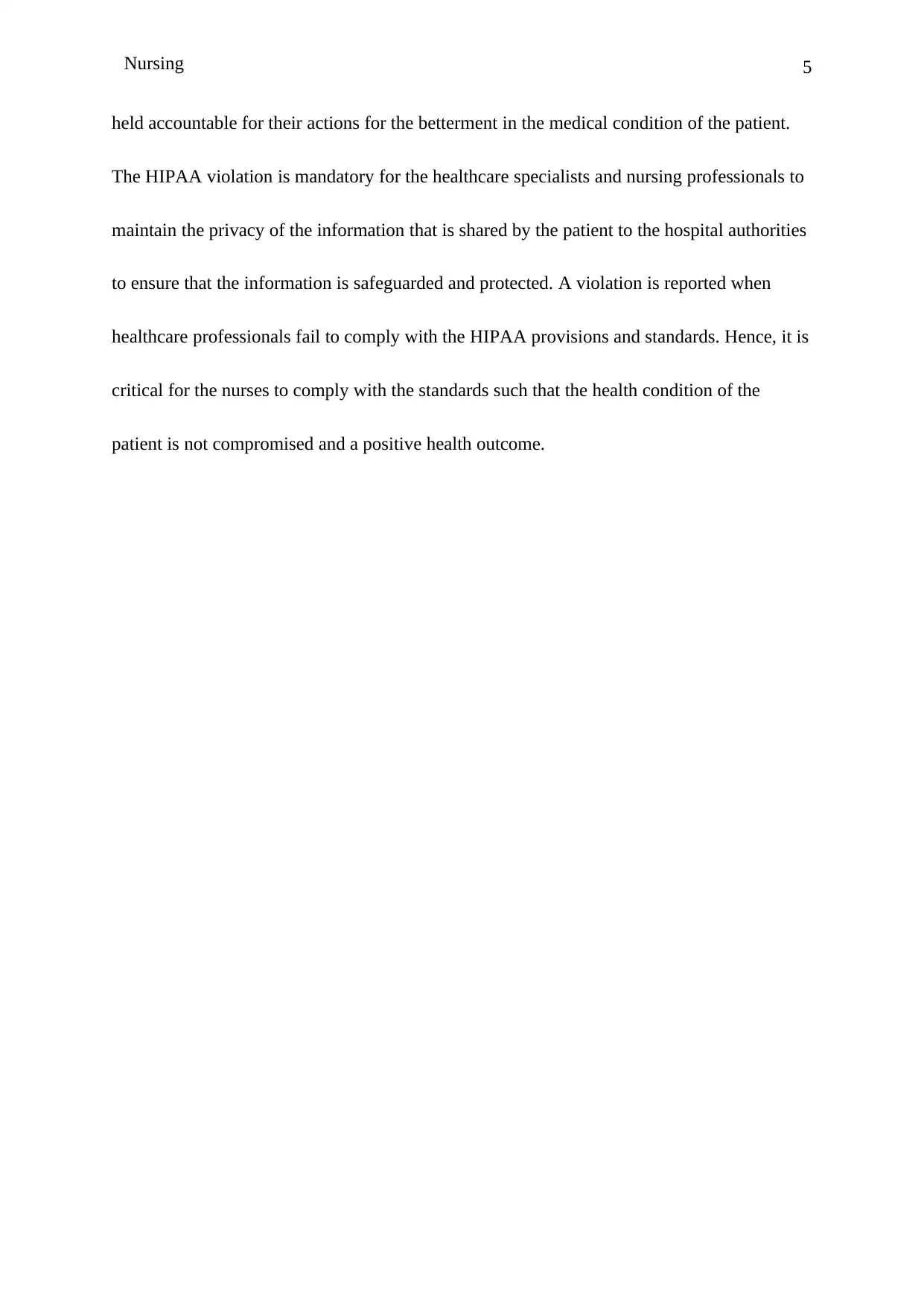
5
held accountable for their actions for the betterment in the medical condition of the patient.
The HIPAA violation is mandatory for the healthcare specialists and nursing professionals to
maintain the privacy of the information that is shared by the patient to the hospital authorities
to ensure that the information is safeguarded and protected. A violation is reported when
healthcare professionals fail to comply with the HIPAA provisions and standards. Hence, it is
critical for the nurses to comply with the standards such that the health condition of the
patient is not compromised and a positive health outcome.
Nursing
held accountable for their actions for the betterment in the medical condition of the patient.
The HIPAA violation is mandatory for the healthcare specialists and nursing professionals to
maintain the privacy of the information that is shared by the patient to the hospital authorities
to ensure that the information is safeguarded and protected. A violation is reported when
healthcare professionals fail to comply with the HIPAA provisions and standards. Hence, it is
critical for the nurses to comply with the standards such that the health condition of the
patient is not compromised and a positive health outcome.
Nursing
⊘ This is a preview!⊘
Do you want full access?
Subscribe today to unlock all pages.

Trusted by 1+ million students worldwide
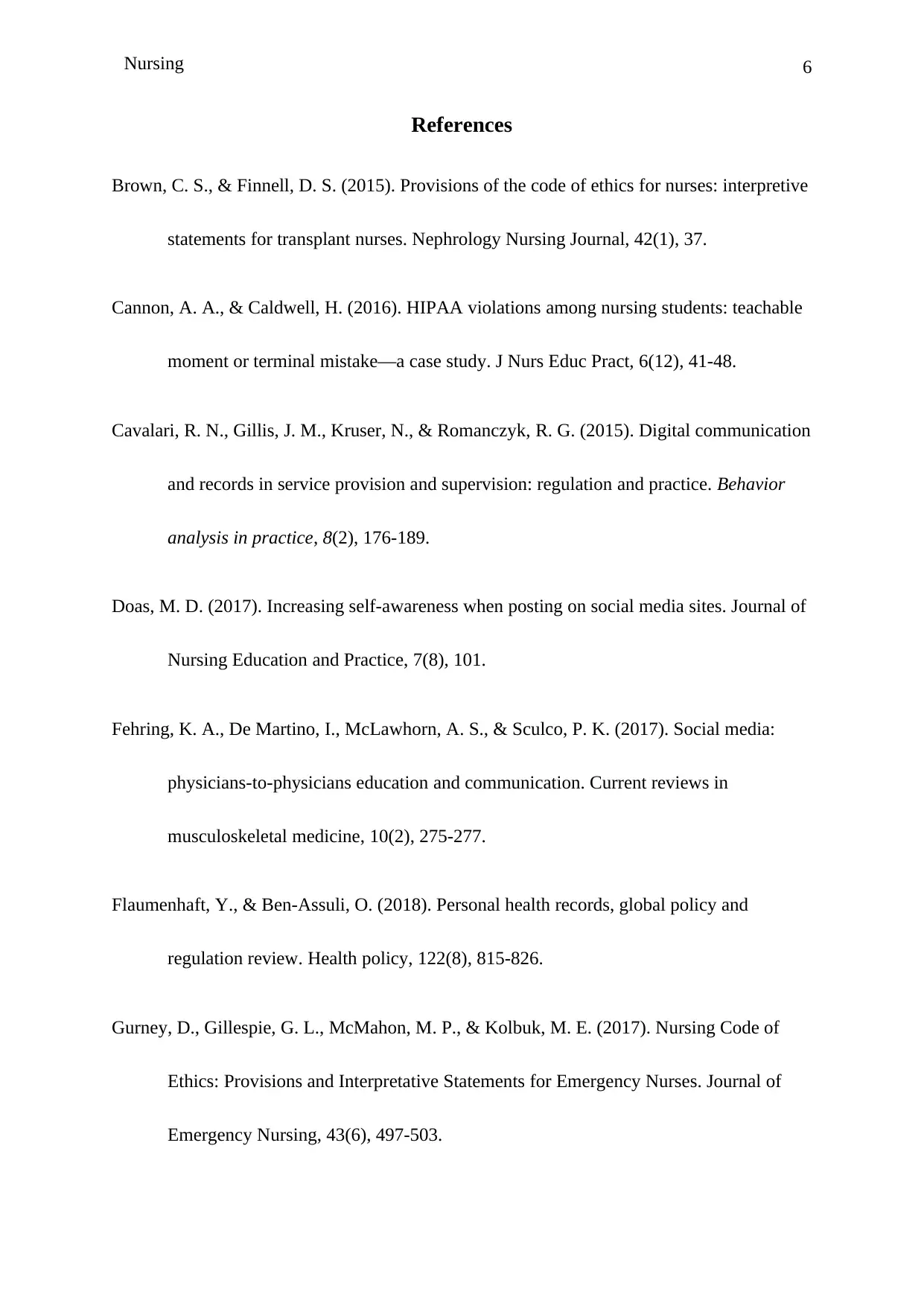
6
References
Brown, C. S., & Finnell, D. S. (2015). Provisions of the code of ethics for nurses: interpretive
statements for transplant nurses. Nephrology Nursing Journal, 42(1), 37.
Cannon, A. A., & Caldwell, H. (2016). HIPAA violations among nursing students: teachable
moment or terminal mistake—a case study. J Nurs Educ Pract, 6(12), 41-48.
Cavalari, R. N., Gillis, J. M., Kruser, N., & Romanczyk, R. G. (2015). Digital communication
and records in service provision and supervision: regulation and practice. Behavior
analysis in practice, 8(2), 176-189.
Doas, M. D. (2017). Increasing self-awareness when posting on social media sites. Journal of
Nursing Education and Practice, 7(8), 101.
Fehring, K. A., De Martino, I., McLawhorn, A. S., & Sculco, P. K. (2017). Social media:
physicians-to-physicians education and communication. Current reviews in
musculoskeletal medicine, 10(2), 275-277.
Flaumenhaft, Y., & Ben-Assuli, O. (2018). Personal health records, global policy and
regulation review. Health policy, 122(8), 815-826.
Gurney, D., Gillespie, G. L., McMahon, M. P., & Kolbuk, M. E. (2017). Nursing Code of
Ethics: Provisions and Interpretative Statements for Emergency Nurses. Journal of
Emergency Nursing, 43(6), 497-503.
Nursing
References
Brown, C. S., & Finnell, D. S. (2015). Provisions of the code of ethics for nurses: interpretive
statements for transplant nurses. Nephrology Nursing Journal, 42(1), 37.
Cannon, A. A., & Caldwell, H. (2016). HIPAA violations among nursing students: teachable
moment or terminal mistake—a case study. J Nurs Educ Pract, 6(12), 41-48.
Cavalari, R. N., Gillis, J. M., Kruser, N., & Romanczyk, R. G. (2015). Digital communication
and records in service provision and supervision: regulation and practice. Behavior
analysis in practice, 8(2), 176-189.
Doas, M. D. (2017). Increasing self-awareness when posting on social media sites. Journal of
Nursing Education and Practice, 7(8), 101.
Fehring, K. A., De Martino, I., McLawhorn, A. S., & Sculco, P. K. (2017). Social media:
physicians-to-physicians education and communication. Current reviews in
musculoskeletal medicine, 10(2), 275-277.
Flaumenhaft, Y., & Ben-Assuli, O. (2018). Personal health records, global policy and
regulation review. Health policy, 122(8), 815-826.
Gurney, D., Gillespie, G. L., McMahon, M. P., & Kolbuk, M. E. (2017). Nursing Code of
Ethics: Provisions and Interpretative Statements for Emergency Nurses. Journal of
Emergency Nursing, 43(6), 497-503.
Nursing
Paraphrase This Document
Need a fresh take? Get an instant paraphrase of this document with our AI Paraphraser
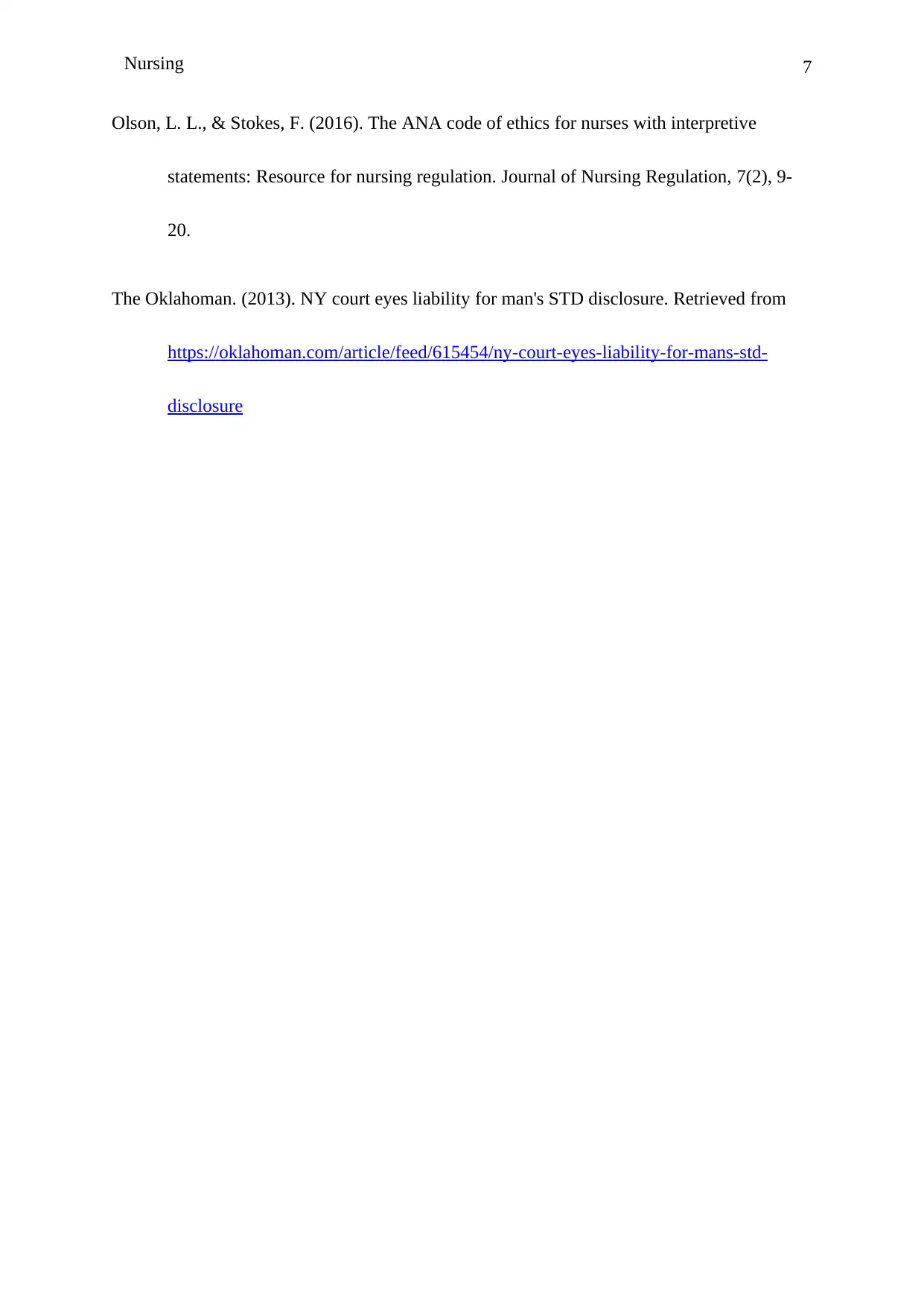
7
Olson, L. L., & Stokes, F. (2016). The ANA code of ethics for nurses with interpretive
statements: Resource for nursing regulation. Journal of Nursing Regulation, 7(2), 9-
20.
The Oklahoman. (2013). NY court eyes liability for man's STD disclosure. Retrieved from
https://oklahoman.com/article/feed/615454/ny-court-eyes-liability-for-mans-std-
disclosure
Nursing
Olson, L. L., & Stokes, F. (2016). The ANA code of ethics for nurses with interpretive
statements: Resource for nursing regulation. Journal of Nursing Regulation, 7(2), 9-
20.
The Oklahoman. (2013). NY court eyes liability for man's STD disclosure. Retrieved from
https://oklahoman.com/article/feed/615454/ny-court-eyes-liability-for-mans-std-
disclosure
Nursing
1 out of 8
Related Documents
Your All-in-One AI-Powered Toolkit for Academic Success.
+13062052269
info@desklib.com
Available 24*7 on WhatsApp / Email
![[object Object]](/_next/static/media/star-bottom.7253800d.svg)
Unlock your academic potential
Copyright © 2020–2026 A2Z Services. All Rights Reserved. Developed and managed by ZUCOL.




